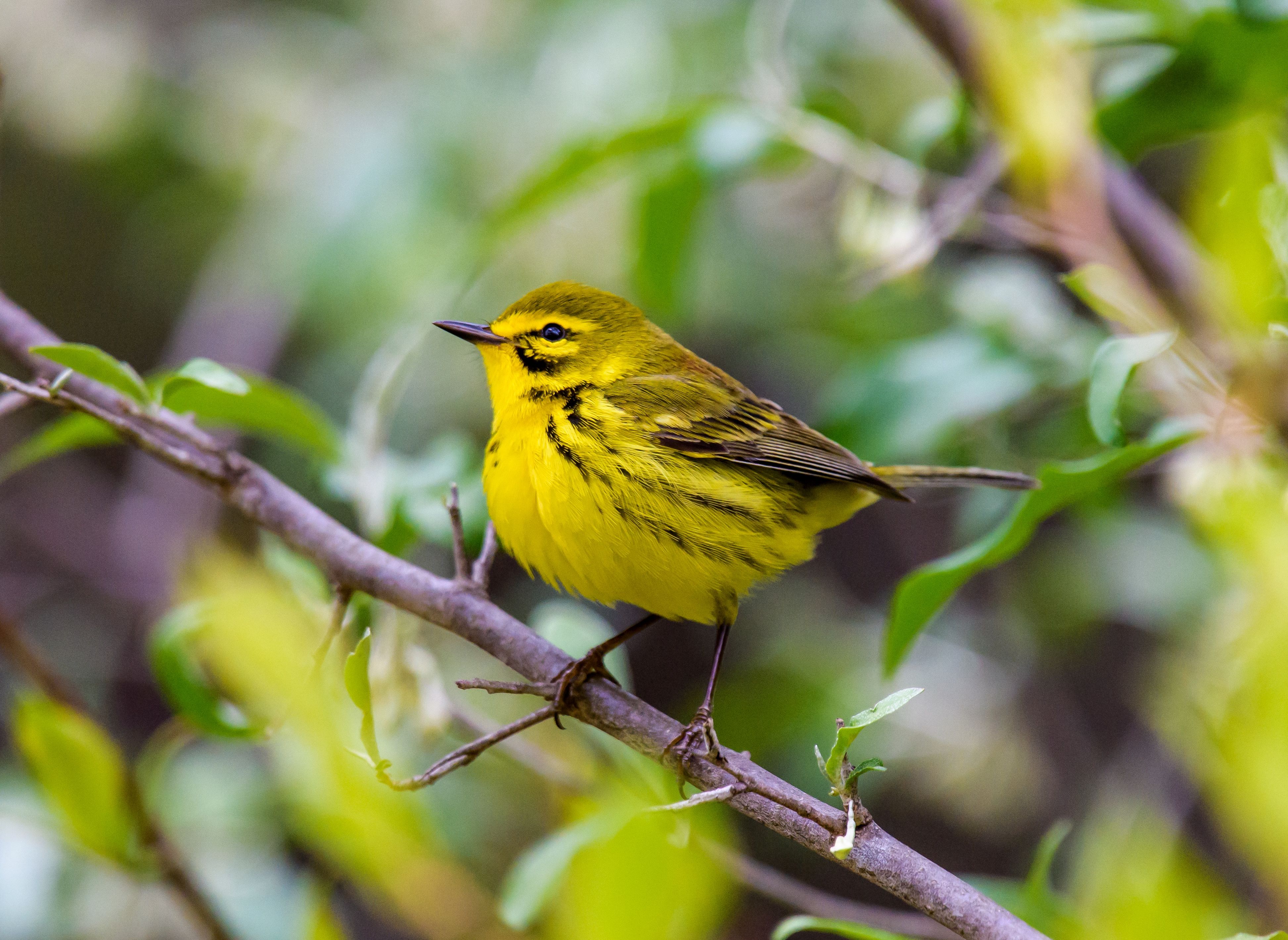
Birders throughout New England are eagerly pulling out their binoculars, hitting the trails and keeping daily records of what birds they spot. Why all the excitement? This is peak time for spring migration in New England and those brightly colored Yellow Warblers, Baltimore Orioles, Scarlet Tanagers, Rose-breasted Grosbeaks and other avian beauties are arriving daily.
North America has over 650 species of breeding birds and more than half migrate each year. That’s a lot of birds!
Why do birds migrate?
Migrating birds are primarily looking for food and nesting locations.
In spring, birds that nest in the Northern Hemisphere tend to migrate north for the abundance of emerging insects, budding plants, seeds and the availability of nesting habitat. As the populations of insects and other food sources drops off in the fall, many species turn around and move south again. Although many believe that cold temperatures are what drive the birds to migrate, more often they are in need of food sources. If you only eat bugs, New England is not the place to be in December!
Here in Rhode Island, not only are we welcoming many migrating birds this time of year, but we are also watching others depart for their far northern nesting habitats, such as Harlequin Ducks, Common Goldeneyes, Bufflehead and Snowy Owls.
Although it is not completely understood, ornithologists and other scientists tell us that bird migration can be triggered by a combination of things: food supply, day length, temperature and the genetic makeup of a species can all play a roll.
"Bird migration is one of nature's most fascinating phenomena,” said Audubon Senior Director of Education Lauren Parmelee. “Now that it's spring, birders are waiting and watching to catch sight of the first of each species as it arrives. The blackbirds, American Woodcock, Osprey and Great Egrets have returned and more are on their way. At the same time we are saying goodbye to the scoters, mergansers and loons who are moving north to nest."
How Far do They Travel?
Not all birds travel the same distance during migration, and here in New England we have many species like the Northern Cardinal that endure the winter weather and are permanent residents. Others may travel through only a few states to reach more stable food sources, and then there are species that travel long distances and winter in Central and South America. While food may be the primary goal for short-distance migration, long-distance patterns are more complex and scientists believe these to be controlled at least partially by the genetics of the various species.
Join the Audubon experts and discover birding during the most popular time of year.
Birding for Beginners - Six Sessions
Audubon offers a six-week class providing a basic understanding of bird biology as well as visual and aural identification techniques. Led by Lauren Parmelee, long time birder and Audubon senior director of education, time will be spent in both the classroom and the field (weather dependent) to practice birding skills. Field trip locations will be determined by the group.
Audubon Environmental Education Center, 1401 Hope Street, Bristol, RI; April 14, 21, 28, May 5, 12, 19, 2018; 9:00-11:00 am; Program Fee: $84 for members, $102 for non-members. Ages: Teen to Adult.
Spring Birding Van Trip
Climb aboard the Audubon van and explore the many birding hot spots of Rhode Island during this exciting time of the year. Warblers, vireos and others will make for an unforgettable trip. Visit many favorite birding spots, as well as some lesser-known locations.
Departs from Fisherville Brook Wildlife Refuge, 99 Pardon Joslin Road, Exeter, RI; May 14, 2018; 8:15 am-4:00 pm; Program Fee: $50/member, $65/non-member. Ages: 14+.
FREE MAY BIRDING WALKS
Get in on the best birding of the year! Novice birders are welcome. Walks are geared for teen to adult. Register online through the events calendar.
Mondays
Fort Nature Refuge, (Rt. 5), 1443 Providence Pike, North Smithfield, RI
May 7, 14, 21, 2018; 8:00-10:00 am.
Note that no walk will be held on Memorial Day, May 28.
Tuesdays
Caratunk Wildlife Refuge, 301 Brown Avenue, Seekonk, MA
May 1, 15, 29, 2018; 8:00-10:00 am.
Maxwell Mays Wildlife Refuge, 2820 Victory Highway, Coventry, RI
May 8, 22, 2018; 8:00 am-10:00 am.
Wednesdays*
Locations determined weekly. Please visit the Audubon website or Facebook page for details, no registration necessary.
May 2, 9, 16, 23, 30, 2018; 9:00-11:00 am.
Thursdays
Marion Eppley Wildlife Refuge, Dugway Bridge Road, West Kingston, RI
May 3, 10, 17, 24, 31, 2018; 8:00-10:00 am.
Touisset Marsh Wildlife Refuge, Touisset Road, Warren, RI
May 3, 17, 31, 2018; 9:30 am-12:00 pm
Fridays
Fisherville Brook Wildlife Refuge, 99 Pardon Joslin Road, Exeter, RI
April 27, May 4, 11, 18, 25, 2018; 8:30-10:30 am.
* Free Wednesday Morning Bird Walks will continue through June 2017.

















